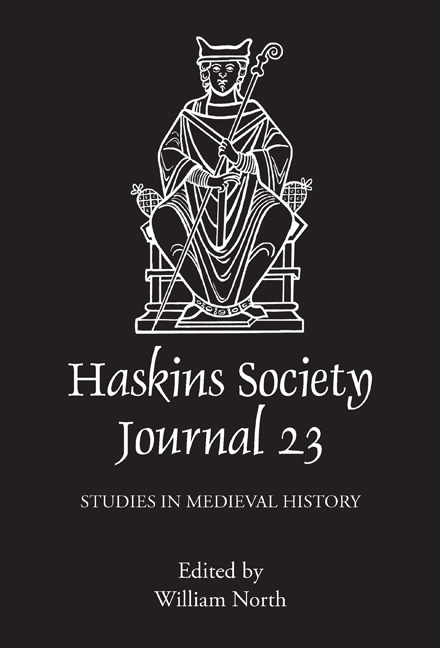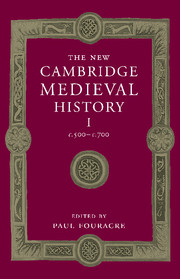52 results
Queens, consorts, concubines: Gregory of Tours and women of the Merovingian elite. By E. T. Dailey . (Mnemosyne Supplements, 381.) Pp. xiv + 202 incl. 2 charts. Leiden–Boston: Brill, 2015. €99. 978 90 04 29089 1; 2214 5621
-
- Journal:
- The Journal of Ecclesiastical History / Volume 68 / Issue 1 / January 2017
- Published online by Cambridge University Press:
- 03 January 2017, pp. 135-136
- Print publication:
- January 2017
-
- Article
- Export citation
Preface: Paul Fouracre, University of Manchester
-
-
- Book:
- Isidore of Seville and his Reception in the Early Middle Ages
- Published by:
- Amsterdam University Press
- Published online:
- 12 December 2020
- Print publication:
- 04 July 2016, pp 7-10
-
- Chapter
- Export citation
5 - The incidence of rebellion in the early medieval West
-
-
- Book:
- Making Early Medieval Societies
- Published online:
- 05 January 2016
- Print publication:
- 21 January 2016, pp 104-124
-
- Chapter
- Export citation
Abbreviations
-
- Book:
- The Haskins Society Journal 23
- Published by:
- Boydell & Brewer
- Published online:
- 05 November 2014
- Print publication:
- 17 April 2014, pp x-xiv
-
- Chapter
- Export citation

The Haskins Society Journal 23
- 2011. Studies in Medieval History
-
- Published by:
- Boydell & Brewer
- Published online:
- 05 November 2014
- Print publication:
- 17 April 2014
Frontmatter
-
- Book:
- The Haskins Society Journal 23
- Published by:
- Boydell & Brewer
- Published online:
- 05 November 2014
- Print publication:
- 17 April 2014, pp i-iv
-
- Chapter
- Export citation
Contents
-
- Book:
- The Haskins Society Journal 23
- Published by:
- Boydell & Brewer
- Published online:
- 05 November 2014
- Print publication:
- 17 April 2014, pp v-vi
-
- Chapter
- Export citation
List of Figures
-
- Book:
- The Haskins Society Journal 23
- Published by:
- Boydell & Brewer
- Published online:
- 05 November 2014
- Print publication:
- 17 April 2014, pp vii-viii
-
- Chapter
- Export citation
1 - Francia and the History of Medieval Europe
-
-
- Book:
- The Haskins Society Journal 23
- Published by:
- Boydell & Brewer
- Published online:
- 05 November 2014
- Print publication:
- 17 April 2014, pp 1-22
-
- Chapter
- Export citation
Editor's Note
-
- Book:
- The Haskins Society Journal 23
- Published by:
- Boydell & Brewer
- Published online:
- 05 November 2014
- Print publication:
- 17 April 2014, pp ix-ix
-
- Chapter
- Export citation
Susan Reynolds, Before Eminent Domain. Toward a History of Expropriation of Land for the Common Good. Chapel Hill: University of North Carolina Press, 2010. Pp. 192. $40.00 (ISBN 978-0-807-83353-7).
-
- Journal:
- Law and History Review / Volume 29 / Issue 1 / February 2011
- Published online by Cambridge University Press:
- 14 February 2011, pp. 309-311
- Print publication:
- February 2011
-
- Article
- Export citation
Frontmatter
-
- Book:
- The New Cambridge Medieval History
- Published online:
- 28 March 2008
- Print publication:
- 08 December 2005, pp i-xviii
-
- Chapter
- Export citation
List of Primary sources
-
- Book:
- The New Cambridge Medieval History
- Published online:
- 28 March 2008
- Print publication:
- 08 December 2005, pp 785-804
-
- Chapter
- Export citation
PART I - THE SIXTH CENTURY
-
- Book:
- The New Cambridge Medieval History
- Published online:
- 28 March 2008
- Print publication:
- 08 December 2005, pp -
-
- Chapter
- Export citation

The New Cambridge Medieval History
-
- Published online:
- 28 March 2008
- Print publication:
- 08 December 2005
Introduction: the history of Europe 500–700
-
-
- Book:
- The New Cambridge Medieval History
- Published online:
- 28 March 2008
- Print publication:
- 08 December 2005, pp 1-12
-
- Chapter
- Export citation
Map 3 Gaul/Francia in the sixth and seventh centuries"
-
- Book:
- The New Cambridge Medieval History
- Published online:
- 28 March 2008
- Print publication:
- 08 December 2005, pp -
-
- Chapter
- Export citation
Frontispiece"
-
- Book:
- The New Cambridge Medieval History
- Published online:
- 28 March 2008
- Print publication:
- 08 December 2005, pp -
-
- Chapter
- Export citation
PART II - THE SEVENTH CENTURY
-
- Book:
- The New Cambridge Medieval History
- Published online:
- 28 March 2008
- Print publication:
- 08 December 2005, pp -
-
- Chapter
- Export citation
Plate section"
-
- Book:
- The New Cambridge Medieval History
- Published online:
- 28 March 2008
- Print publication:
- 08 December 2005, pp -
-
- Chapter
- Export citation



